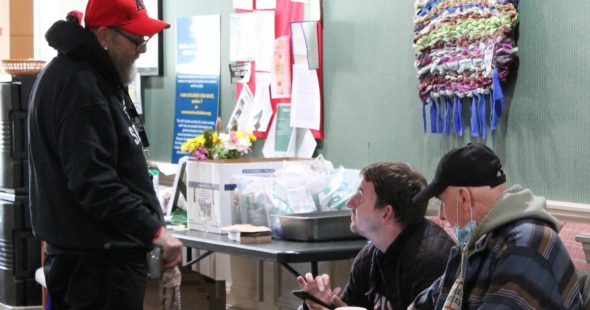by Danilo Sanchez and Sherri Brokopp Binder
(A version of this article originally appeared in The Mennonite.)
When the COVID-19 crisis hit, many organizations and social service agencies in our area of Allentown, PA made the decision to close their doors. That was understandable.

But closing was not an option for Ripple Community, Inc., a conference-related ministry. We needed to maintain contact with families in our community-supported housing program, since many of their supportive services were closed and their lives could quickly spiral out of control. We also needed a stable presence at our day center, which primarily serves people experiencing homelessness. Stay-at-home orders are meaningless for people who don’t have homes.
We are still here, doing what we have always done, but things look different. Everyone who enters our day center has their temperature taken, is asked some medical questions, and gets doused with hand sanitizer. We do our best to maintain safe physical distancing. Our staff members wear gloves and masks. Being open during the pandemic is how we make sure our friends know they are not forgotten or abandoned.
Even under normal circumstances, our unsheltered friends and neighbors live precarious lives. COVID-19 has shone a bright, public light on cracks in the system through which we have watched our friends fall for years.
One day, Rafael came into our community center as he does most days. He appeared more tired than usual, but his temperature was normal, and he didn’t have any obvious respiratory symptoms.
Rafael found a chair at an empty table and enjoyed his meal. He usually moves between his table and the coffee station, but today he rested. Later, we noticed he had fallen asleep in his chair. Occasionally, his body jolted from a deep cough. We took his temperature again, and it read 99.5.
Following our COVID-19 protocols, we moved Rafael into a separate room and called the hospital hotline. The nurse on the phone asked Rafael a series of questions. She counseled him to come to the hospital and get tested. We arranged for a medical taxi to transport Rafael. Then we sat with him and waited for the taxi. He didn’t appear to be afraid, but he had a lonely look on his face.
Who was caring about Rafael? We didn’t want him to feel alone. If nothing else, at least he has us. Before Rafael got into the taxi, we made sure his cell phone was fully charged.
We called him two hours later. Rafael answered, but his voice was strained. He sounded stressed but resigned. He had been tested and told it would be two to three days before he received the results. The hospital staff instructed him to go home and self-isolate until they got the results.
“That’s a little hard to do when you’re homeless, you know?” Rafael said. We asked him to come by the community center the next day. He spent the next three days wandering the streets with a cough and a fever.
Rafael’s story is tragic, infuriating, and quite common these days. We know we can’t fix every problem or meet every need in our community. But we are determined to continue to be a stable, consistent presence. This has always mattered in our community, but it seems particularly important now. Our staff of five has been working harder than ever, with less help than normal, and we are exhausted. Yet we wouldn’t have survived without the support from our local community and churches and conference. Communities will take time to build, but if we all work together, we will be resilient.







